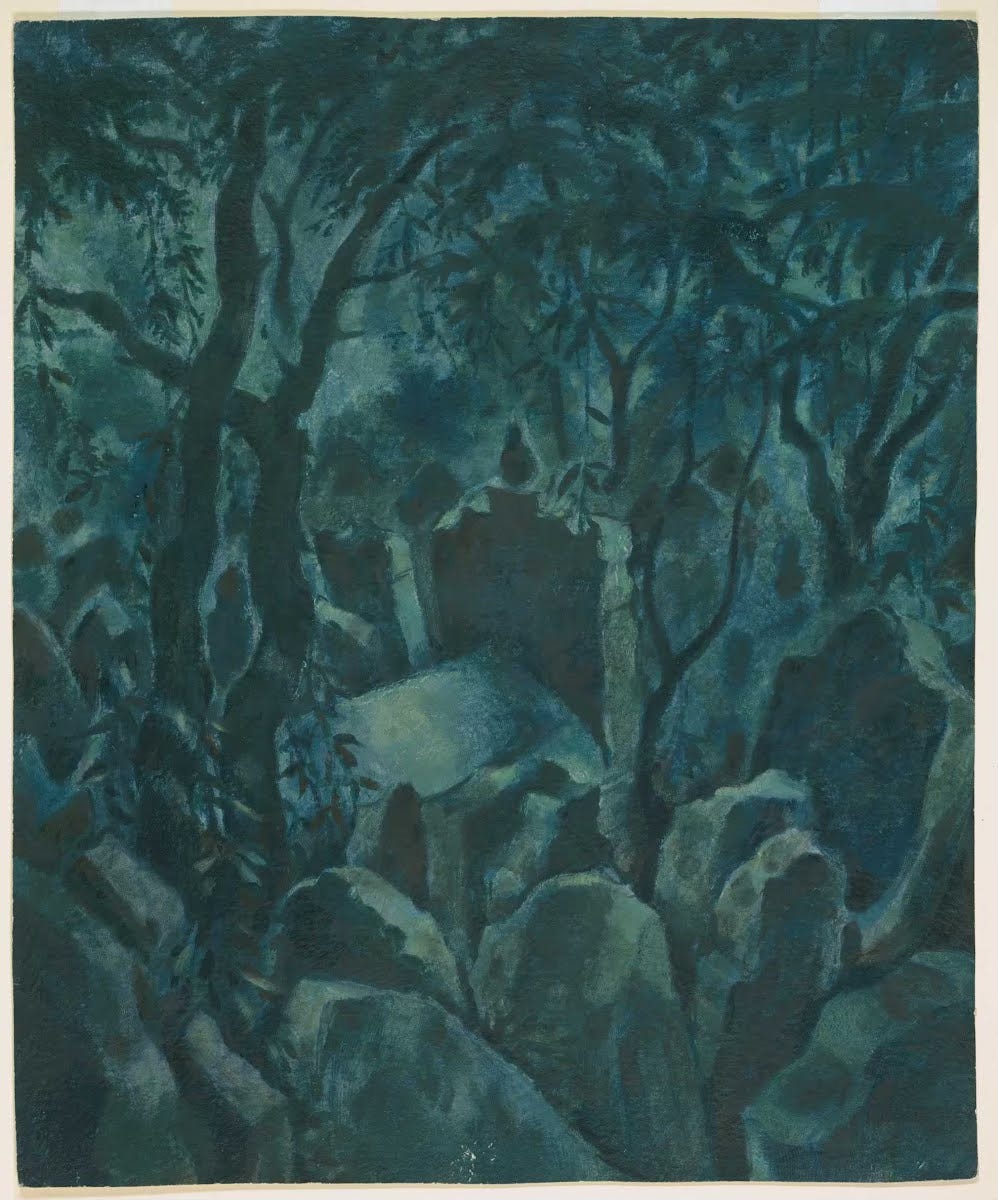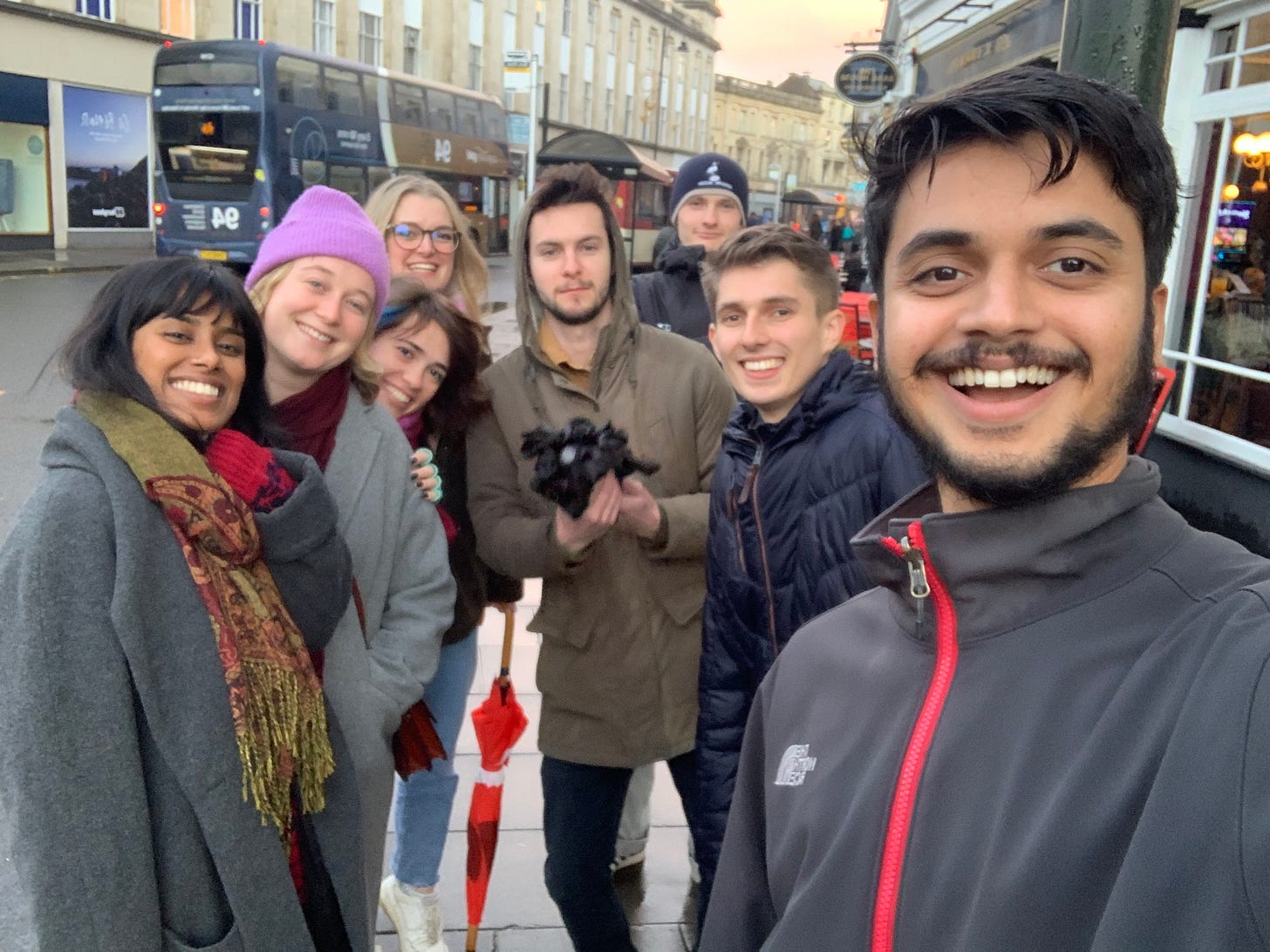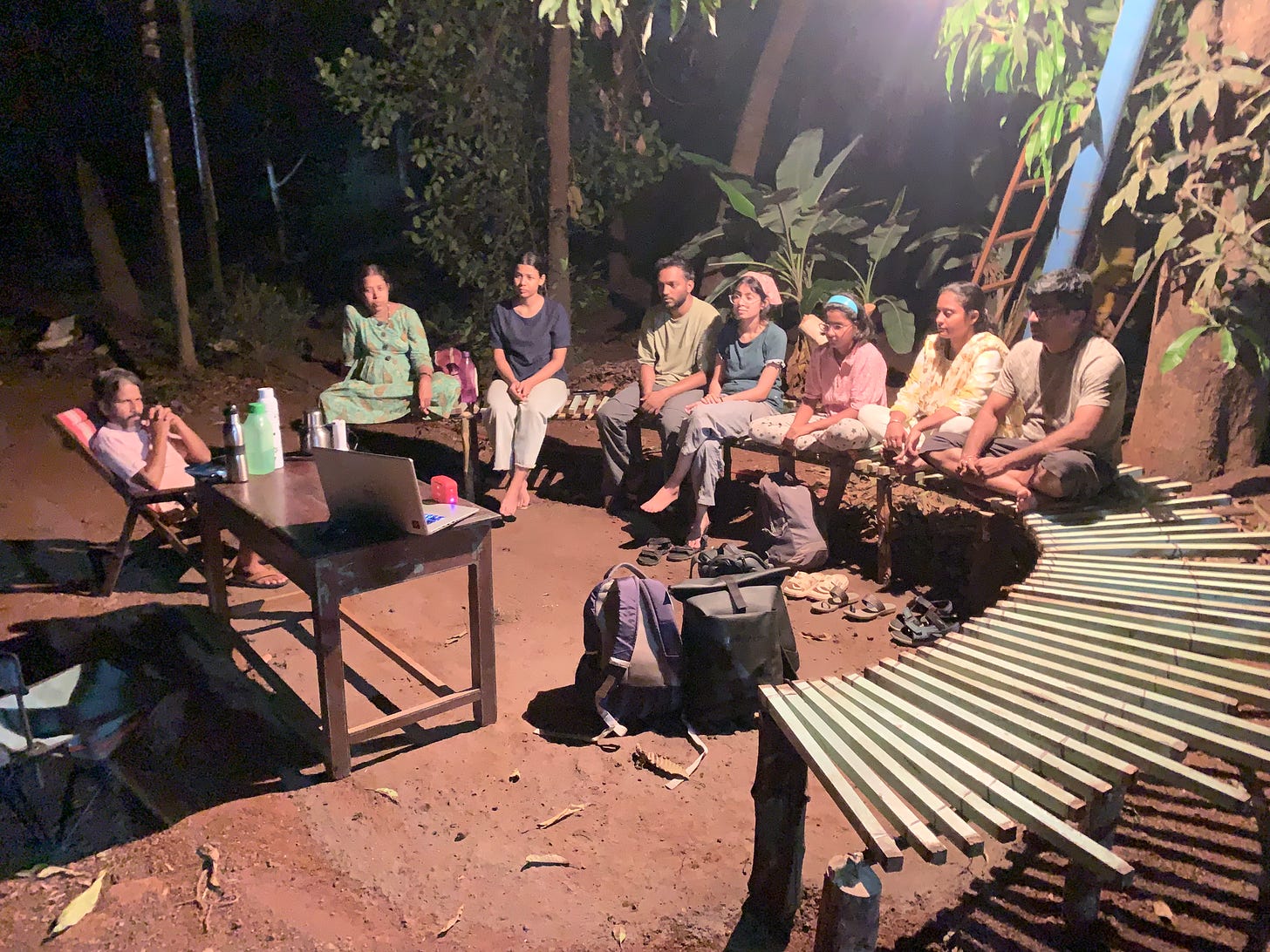“Ash. Wake up. My mother has hanged herself.”
Filip rushed in and said this with a bewildered look on his face.
I had no idea how to react.
Hello everyone, welcome back to the Book of Ptah. I have started to write more often after the few months of writing hiatus. I hope all of you are well. Thanks for subscribing.
After completing my first walk across India, I had decided to return to England to wrap up a few unfinished things. This time, I came back wiser. I’d made sure not to sign any housing contracts that might tie me down to a place. Most of my university friends had moved on—some to Bristol, others to London, a few to Sheffield.
But there was one friend who had stayed—Filip. He had set up a base in Cheltenham.
Filip studied landscape architecture. Though we were a year apart, and I came from a completely different field, we had been close since our earliest university days. I suppose it was his immigrant background that helped forge a deeper connection between us. Filip’s family was from Poland. They had moved to England long ago, like many others who left Eastern Europe during times of economic uncertainty. His was one of those quiet, hardworking families who built a life here without ever fully losing their roots.
He was deeply connected to them. There was a warm, lived-in feel to his house, and that extended to the way he spoke about his people. That, and of course, the wild Polish side of him—the one that danced furiously to techno after a few shots of vodka.
All of it added up. We made good friends. He was into foraging, I was into walking—we balanced each other out.
Even when I left England to walk across India, we stayed in touch.
I called him the moment I landed back in London.
“Fil, it’s Ash. Believe it or not, I’m back in England.”
He was overjoyed. I could hear the smile stretching across his face through the phone.
“Where are you staying? Are you coming to Cheltenham?” he asked, buzzing with excitement.
“Yes,” I said, “but I don’t have a place yet.”
“Don’t you worry, brother. We’ve got a room in the basement, and the house is always open for you.”
And just like that, I had a roof over my head.
I know many read this and press escape, but if you really like what I do, then please go on to support me by donating or buying me a coffee.
It had been a year of growth. A year of reckoning. A year of learning what mattered, and what didn’t. I was happy to see Fil again. That same wide smile, the same sense of ease.
But then he told me about his mom.
She was battling addiction—not to alcohol or street drugs, but to prescription medication. The same pills that were supposed to help her with depression had pulled her deeper into it. She had reached a point where she couldn’t function without them—and when she did take them, she felt numb, hollowed out. Her mind was in a fragile state. A fog she couldn’t walk through.
I remember us sitting on the old sofa, making coffee, and talking late into the night. We spoke about healing, about alternatives. I even suggested a transcendental reset—maybe a psilocybin trip in Amsterdam to stir her out of the loop. He listened, half-hopeful, half-weary.
Days passed. Work calls came in from Sheffield and Edinburgh. I packed up, bid him goodbye, and went on with what I had to do. But throughout my travels, I kept checking in with Fil. I’d ask, “How’s your mom?” Always the same sigh, a pause, and then a hopeful "better, I think."
Two months rolled by. Somewhere up in the Scottish Highlands, I took a break in a bothy to think about my life—what I wanted from it, where I was going. And I found some answers there, in the silence of those stone walls. Before heading back to London, I decided to backtrack to Cheltenham and Bristol. There were friends to see. Threads left hanging.
The day I reached Cheltenham was the day of Filip’s graduation. The day he was supposed to throw his hat in the air and step into a new chapter of his life. He had already lined up a job at a landscape design studio somewhere in the Midlands. Everything was moving in the right direction.
We walked around town, talking like the old days. Fil, who had grown more serious over the past year, was back to being his playful self. We met some mutual friends, then ended the night at a friend’s apartment. We drank a little, swapped stories, laughed like the past hadn’t passed.
Later that night, we returned home—just the three of us: Fil, me, and a Greek friend of his named Marialena.
We sat on the same sofa and made ourselves coffee again. This time the conversation drifted to Greek philosophy.
That night, after the little post-convocation gathering, we found ourselves back in the house. It was quiet, with the soft hum of the refrigerator and the occasional car passing outside. The party mood had dissolved into something gentler, something reflective. The three of us—Fil, me, and a Greek friend of his, Marialena—sat down in the living room with our coffees, each of us holding the last warmth of the day in our mugs.
Marialena was someone I had met only briefly before, but she had that kind of still presence that made it easy to talk. The kind of presence that doesn’t push its way into the conversation but gently invites silence to speak.
We got talking about Greek philosophy.
“Do you believe in fate?” she asked, half-smiling, tracing the rim of her cup with her finger.
“Not as something fixed,” I said, “but as a pattern maybe. Something we dance with, something that changes if we change our step.”
Fil nodded. He wasn’t saying much. He seemed calm but unusually quiet—his eyes fixed on the floor for long stretches. Maybe he was tired from the day. Or maybe he was already feeling something he didn’t yet know how to name.
Marialena leaned back, her voice soft but assured. “The Stoics believed that we don't control what happens, only how we respond. That freedom lies not in changing events, but in changing our relationship to them.”
I remember saying, “That makes sense in theory. But what about grief? Or shock? Can one really respond to a storm as calmly as to a breeze?”
She looked at me for a moment, and then said something I’ll never forget:
“Even Odysseus wept. Even gods bled in Greek myths. Strength was never about not breaking—it was about knowing what to do with the broken pieces.”
There was a long silence after that. The kind that only happens when someone speaks a deep truth.
Fil got up and made another round of coffee. Marialena stood by the window for a while, staring into the night. Then she turned to us, smiled, and said, “I should go. It’s late, and the walk back is long. But this,” she looked at both of us, “was beautiful.”
She gave us a warm hug—no words. She left quietly, the door clicking gently behind her.
Fil and I were alone again. He seemed more restless now. The energy in the room had changed, but I couldn’t place it yet. I thought it was just the end-of-the-day tiredness, the emotional weight of parting ways with old friends.
I walked down to the basement and lay on my sleeping bag. The warmth of the coffee lingered in my chest. I thought about what Marialena had said, about broken pieces, about myths. I closed my eyes.
Not long after, I heard the basement door creak open.
“Ash.”
I turned. Fil was standing there, his face pale, hollowed out.
“Ash… wake up. My mother hanged herself.”
Everything froze.
He stood there, like a man thrown out of the fabric of time, holding a sentence too heavy for any human to speak.
“She… she stayed back. Didn’t come to the graduation. Said she wasn’t feeling well. Everyone else went. And when they came home—”
His voice cracked. His eyes were lost.
“They found her. She left a note.”
He looked down, and then at me.
“I can’t deal with this depression, these medications any longer. I leave the rest of my life to you, my son. I love you.”
There was nothing I could say. I sat up and just held him. The world had just cracked open. Words felt irrelevant.
That night, sleep didn’t come. The basement felt colder than usual, like grief had crept into the walls.
And still, the words Marialena had spoken circled in my mind.
“Even gods bled.”
Life isn’t a straight road. It twists. It drops. It breaks us. And in those moments, no degree, no philosophy, no plan prepares us.
But maybe—just maybe—the conversations we have, the love we share, the silences we hold… maybe that’s what makes us whole again.
That night, life changed for Fil. And it changed for me too.
Because the people we walk with—even for a little while—leave something behind. A truth. A warmth. A sentence that sticks.
I think of Marialena’s walk home in the dark. I think of Filip’s mother and the invisible weight she carried. And I think of that one line she wrote.
“I leave the rest of my life to you.”
We don’t choose what we inherit. But we can choose what we do with it.
We can make gardens out of grief.
We can forge strength out of sorrow.
And on days when the world breaks, we can still sit with a friend, make a cup of coffee, and say to life—
“I’m still here.”
If you have reached this far then I hope it means you like what I’m doing and if so you might consider supporting me by ‘buying me a coffee’ ( Substack does not let me monetize my articles because I am based in India) which is a one off payment rather than a continuous subscription. Payments, however small, encourage me in my writing and mean that I can spend more time honing my skills.
One more thing before you go..
…would you like to help me on the ground?
I have been actively engaged in creating an eco-village. It will be based on the models of agro-tourism, permaculture. The economy generated will help the people living in the village. Many from the younger generation have been leaving the village to the urban centres due to the lack of jobs.
What we did in the past three months is, we started conducting workshops, wherein some got paid for their guide skills, self-help women-led groups got paid for making food to the ones attending the workshop.
In these workshops we shared cultural learnings, we created a safe space for digital detox and we encouraged younger kids to experience nature. This gave a feeling in the village that saving nature can also be an economic model.
Now, as we move further, we will be focusing on natural building methods to build shelters to accommodate sustainable tourism, and we will be working with the local youngsters to sponsor them and use their skills to create products that could get a market. A website is already underway!
We will need your help in building this project. If you have been witnessing my journey and have been reading this Substack for some while, I’d urge you to spend as little as $10, even that would be a lot of help. You can donate here. (For Indians, you can donate on this UPI id - 8983726737@ybl )
If you wish to donate more I’d hold personal zoom sessions with you to see how can we use your help.
It will help me build this eco-commune faster and the money will be used in getting solar lights and other necessary things to help the local rural community. This is the way you can directly help even when you are sitting oceans away from us.
Thanks, Ash.









Hey Ashutosh! Hope you are doing well. This piece was heartbreaking. Hope your friend finds the courage to move forward and heal!